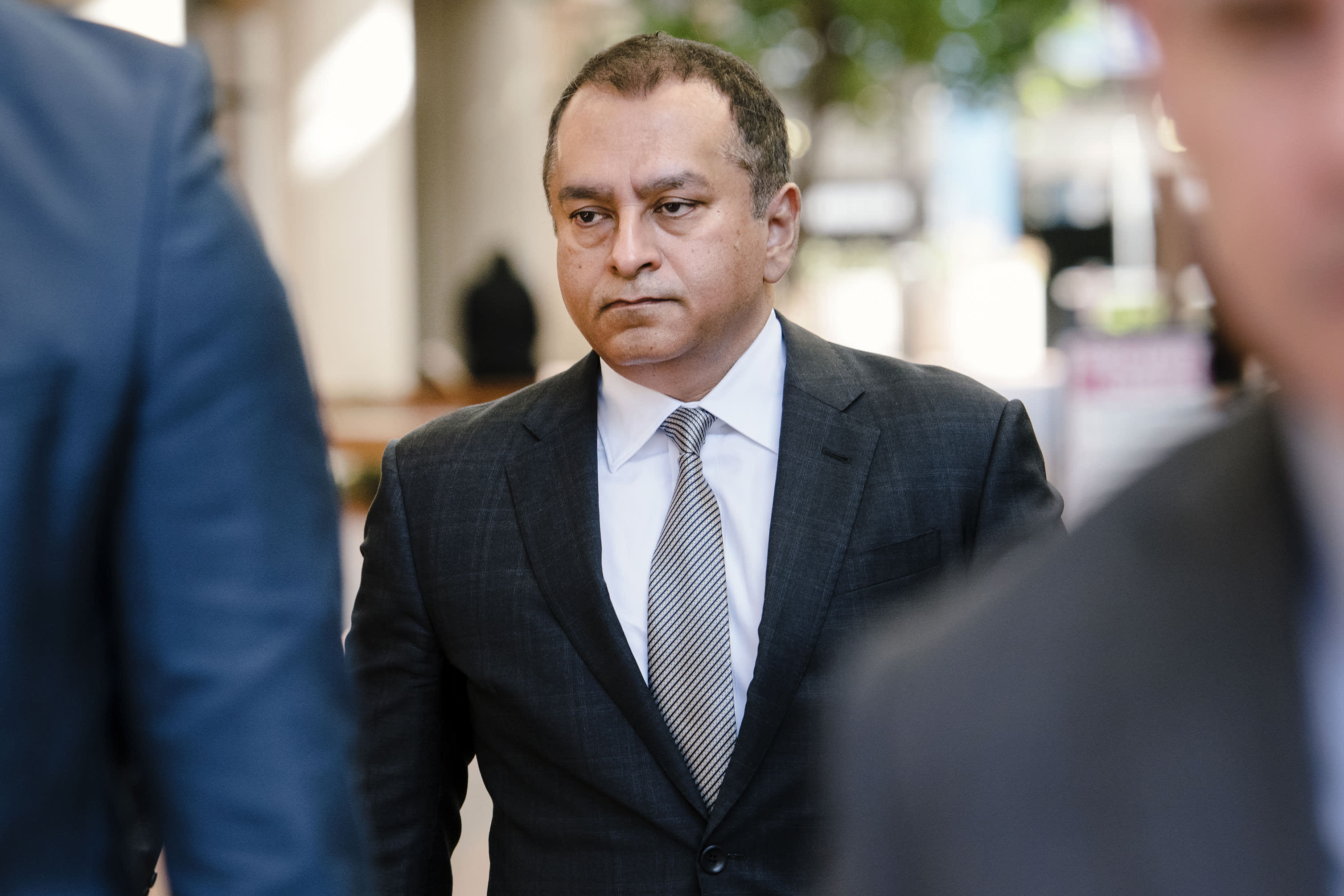Theranos saga returns to courtroom as Holmes’ top deputy Balwani set for criminal trial

He was the man behind the lab curtain at blood-testing start-up Theranos. Now he takes center stage in his own criminal fraud case.
Opening arguments in the trial of Ramesh “Sunny” Balwani, former president and chief operating officer of Theranos, begin Wednesday in the San Jose federal courthouse, where a jury in January found Theranos ex-CEO Elizabeth Holmes, guilty of four counts of wire fraud and conspiracy to commit wire fraud.
A jury of six men and six women will decide the fate of Balwani, who has been charged with the same crimes as Holmes. Each carries a penalty of up to 20 years in prison. He pleaded not guilty.
While Holmes awaits sentencing in September, she could reemerge as a key witness against Balwani. In addition to serving as Theranos’ No. 2 executive, Balwani was Holmes’ boyfriend.
During her trial, Holmes accused Balwani of a pattern of sexual and psychological abuse, which “impacted everything about who I was,” she told the jury. Balwani has denied the allegations.
Reed Kathrein, an attorney who represented some investors in a lawsuit against Holmes and Theranos, told CNBC that Balwani was central to the Theranos ruse, which involved lying about the company’s technology and bilking shareholders out of hundreds of millions of dollars.
“Sunny ran everything, knew everything,” said Kathrein, who isn’t involved in Balwani’s criminal fraud case. “While he may not be the public face and he may not have made the statements, he was completely complicit in getting the money from investors and patients.”
Widespread publicity surrounding Holmes’ case delayed opening arguments, as Judge Edward Davila and the attorneys representing each side had difficulty finding a full slate of unbiased jurors. It took four days and the questioning of close to 100 candidates to fill the 12-person jury.
During jury selection, more than half of the potential jurors raised their hands when asked by attorneys if they had heard about Holmes or Theranos. Several said they had knowledge of Holmes’ abuse claims against Balwani.
Prosecutors haven’t said whether they plan to call Holmes back to the stand after she served as the main witness in her own trial. Kathrein said Holmes could testify against Balwani in a bid to reduce her prison sentence.
“Elizabeth has already indicated that she wants to throw him under the bus,” Kathrein said. “She did it when he left Theranos. She did it again at her own trial. I would not be surprised if she throws him under the bus yet again and testifies to save herself from a harsh sentence.”
Balwani’s attorney, Jeffrey Coopersmith, declined to comment. Attorneys for Holmes didn’t respond to CNBC’s request for comment.
Balwani, a former software executive who made millions during the dot-com boom, met Holmes in 2002 in Beijing, where they were both studying Mandarin. It was the summer before Holmes’ freshman year at Stanford University. She was 18, he was 37.
Holmes started Theranos the following year and soon dropped out of Stanford. In 2005, she and Balwani moved in together in Palo Alto, California. However, their 12-year romance was largely kept a secret from investors, business partners and employees.
Balwani’s involvement with Theranos began in 2009. The company was struggling financially, and Balwani stepped in by providing a $13 million loan. Six months later, he was president and COO.
According to Holmes, Balwani was her mentor and advised her on how to run a company. In her testimony, she said she understood Balwani to be a successful businessman and that he worked for Microsoft co-founder Bill Gates.
In the most dramatic moment of her four-month trial, Holmes described Balwani’s controlling behavior. She told the jury Balwani dictated everything from her schedule to her diet. However, she stopped short of blaming the all of the mishaps on Balwani and said he never told her what to say to investors or pharmacy partners like Walgreens.
“He wasn’t who I thought he was,” Holmes told the jury. “And I realized if I was going to fix the issues and allow the company to see through its potential I had to do that without him in the company.”
Holmes said she moved out of the Silicon Valley home they shared in 2016, after an inspection from regulators revealed major problems inside the Theranos laboratory. Balwani left Theranos later that year.
‘More airtight’
In March 2018, the Securities and Exchange Commission charged Balwani and Holmes with “massive fraud.” While Holmes agreed to settle the SEC’s charges without admitting or denying the allegations, Balwani rejected the settlement and is fighting the charges separate from his criminal trial.
Danny Cevallos, an attorney and NBC News legal analyst, said Balwani is at a disadvantage because Holmes has already been convicted. Text messages obtained by CNBC during the Holmes trial show both Balwani and Holmes were involved with the company’s daily operations.
The government “figured out what worked and what didn’t work with Holmes,” Cevallos said. That makes “this case is even more airtight,” he added.
Barbara McQuade, a former U.S. attorney, agrees that Balwani faces long odds.
“There’s typically more of an advantage to the defense when it’s the second time through a case,” said McQuade, who’s also an NBC legal analyst. “Witnesses almost always make minor contradictions in their testimony. A defense attorney who is good will recognize those inconsistencies and point them out to show that the witness’ memory is fallible.”
But prosecutors may prefer not to call Holmes, McQuade said, because “she’s a known fraudster and she’s good at fraud.”
Cevallos also sees the rationale to keeping Holmes off the stand.
“The government knows firsthand what a convincing person Elizabeth is,” Cevallos said. “It’s essentially what they prosecuted her about. They’ve already won a case without her, and they probably don’t want her to get off lighter than Balwani.”
